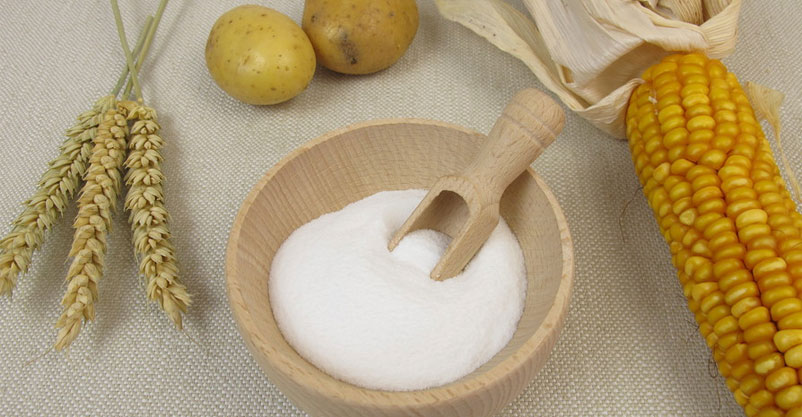The Short Answer:
Table of Contents
What is Dextrose?
Dextrose is sugar and is chemically identical to Glucose (Blood Sugar). Glucose is the sugar our body extracts from food and transports via our bloodstream to our cells as energy. While found in our bodies, it can also be produced artificially (Dextrose is a component in most processed and packaged products as a sweetener) and is also known as corn sugar or grape sugar.
Dextrose can also be used medically, for example as treatment, for Hypoglycemia (low blood sugar). Due to availability and low production costs, Dextrose is used extensively for a range of applications but is Dextrose bad for you? It’s a fairly common question and in the following article, we investigate the pros and cons of Dextrose, potential side effects, and impact on patients with Diabetes , Kidney Disease , and Heart Disease.
Common Uses of Dextrose
Dextrose is a component in most natural starchy foods such as wheat, potatoes, and rice; it’s also obtained naturally from living organisms. Honey and fruits are other rich sources of Dextrose.
The baking industry uses Dextrose as a sweetener and resembles a fine powder (similar to icing sugar) or syrup.
Also employed in hospitals for intravenous injections Dextrose is mixed with sterile water, combined with sodium and sometimes combined with amino acids. The solution can then be administered intravenously to patients who are unable to consume sufficient nutrients. Dextrose is also found in tablet or oral gel form and is available from most over-the-counter pharmacies.
Is Dextrose Bad for You?
If you are allergic to Dextrose , then it is of course, wise to avoid foods that contain it. There are specific medical conditions that MAY interact with Dextrose however, research is inconclusive at this stage.
Therefore, it is advisable that you are cautious and first seek medical help before taking Dextrose if you experience any of the following conditions:
- Pregnancy
- Breastfeeding
- Coma resulting from liver or diabetic complications
- Bleeding (Head, spine)
- Pulmonary Edema (Fluid build up in the lungs)
- Peripheral Edema (swelling of extremities e.g. arms, legs, feet)
- Hypokalemia (Deficiency of potassium in the bloodstream)
Dextrose may also lead to a rapid spike in blood sugar level if taken in excess. Digested rapidly, it prevents the digestion of fats, therefore, leading to weight gain.
Side Effects of Dextrose
Dextrose is thought to be responsible for several side effects. However, these side effects vary from one individual to another. Such side effects include;
- Increase in thirst
- Swelling of arms, face, and legs
- Upset Stomach
- General fatigue
- Running short of breath
- Nausea
- Frequent urination
- Vomiting
- Skin dryness

Dextrose molecule, chemical structure.
Alternatively, there are pros to using Dextrose, these include:
-
Rich in carbohydrates
A 100 gram serving of dextrose contains 92% of carbohydrates. Carbohydrates are the primary source of energy for your body. -
Absorbed rapidly
If you want to recover your lost energy quickly, Dextrose is absorbed quickly. It delivers energy to muscles faster than any other food. -
Effective Post Workout Supplement
Taking Dextrose post workout can lead to a spike in Insulin which can replenish Glycogen in your muscles which are lost during your workout.

How Does Dextrose Affect Diabetes
Diabetes
 Since Dextrose has a
high glycemic index
, it makes blood sugar skyrocket quickly. Due to this fact, it is used as an intravenous agent for preparing injections for dehydration and low blood sugar. In case you are diabetic, you need to be careful with the type of foods that contain Dextrose as a sweetener or ingredient.
Since Dextrose has a
high glycemic index
, it makes blood sugar skyrocket quickly. Due to this fact, it is used as an intravenous agent for preparing injections for dehydration and low blood sugar. In case you are diabetic, you need to be careful with the type of foods that contain Dextrose as a sweetener or ingredient.
While you may view Dextrose as a good source of energy, too much intake leads to depletion of Insulin , which controls blood sugar levels. Reduction of Insulin results in the accumulation of blood in the cells leading to Type 2 Diabetes.
Kidney Disease

Kidney Disease
According to research carried out by the by American Journal of Renal Physiology , Fructose has a tendency of accelerating chronic kidney disease. However, Dextrose has no such effect. If you have kidney disease, it is better to choose foods sweetened with Dextrose than those with Fructose .
Heart Disease
 A study carried out by JAMA Internal Medicine in 2014
revealed that there is a close relationship between the intake of sugar and risk of heart disease
. Therefore, if you consume foods with processed Dextrose, you increase the risk of heart disease. The recommended limit for added sugar should not exceed six teaspoons a day.
A study carried out by JAMA Internal Medicine in 2014
revealed that there is a close relationship between the intake of sugar and risk of heart disease
. Therefore, if you consume foods with processed Dextrose, you increase the risk of heart disease. The recommended limit for added sugar should not exceed six teaspoons a day.
Dextrose and Dental Health
 All sugars we eat accumulate in our teeth and form a plaque where bacteria thrive. These bacteria produce waste products that are released in the form of acids which can damage your enamel and form cavities.
All sugars we eat accumulate in our teeth and form a plaque where bacteria thrive. These bacteria produce waste products that are released in the form of acids which can damage your enamel and form cavities.
Summary
Dextrose, like most sugars, is risky if you have diabetes or conditions such as Alzheimer’s disease, stroke, heart disease, and other pulmonary complications. You should, therefore, be mindful, of processed food that contains Dextrose.
